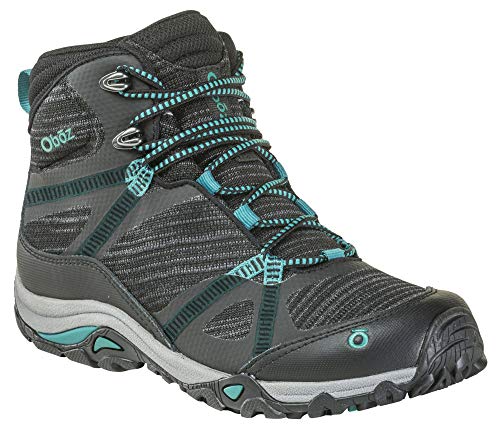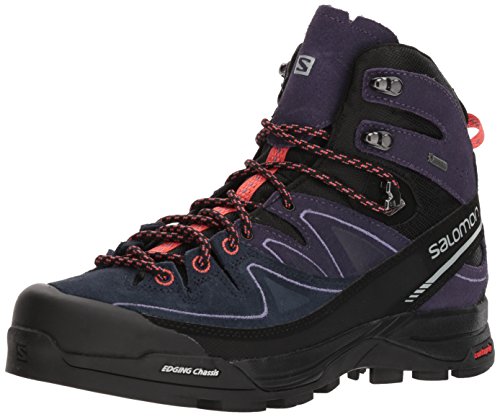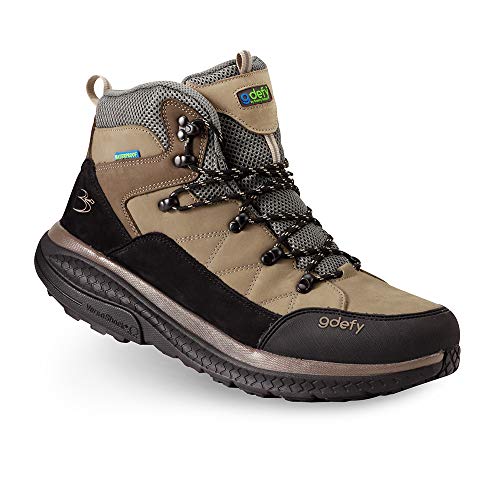Best Women’s Hiking Boots (Reviews) for Bad/Weak Knees
Even if we deal with the various foot, hip, or knee discomfort, we tend to ignore the pain and carry on with our daily lives and activities. More often than not, we blame age for our knee pain or aching hip; but it’s the footwear (the wrong one) that is the main culprit.
Even though we enjoy hiking, we often don’t realize that it puts a lot of pressure on our bodies, feet, and joints. When we’re using the wrong pair of hiking boots, not only that, we cannot enjoy hiking to the fullest, but we also end up with unnecessary pain.
If you know that you have weak/bad knees, choosing the proper pair of boots will help you have fun while hiking per se. The appropriate amount of support and padding can make a difference. We know that hiking may not be the best activity for your bad knees, but the proper hiking boots will still allow you to enjoy the challenging hikes.
Top Women’s Hiking Boots for Bad/Weak Knees
1. Oboz Lynx Mid B-Dry Hiking Boot – Women’s
For hikers who aren’t afraid to take the less maintained tracks despite their weak knees, the Oboz Lynx Mid B-Dry Hiking Boot – Women’s make a perfect choice.

See reviews and pricing on Amazon
As support and comfort are fundamental for weak knees, we should highlight the high-density EVA contoured arch for better support. The EVA (also high-density) deep heel cup for superior support and stability. The EVA pods provide shock absorbency and rebound, and the medium-density EVA provides exceptional underfoot support. Even if the EVA midsole is single-density, it still ensures good padding and balanced support.
The list of features counting for stability continues with the TPU chassis providing torsional stability underfoot and protection, and the EVA Super Skin (ESS) plate reducing over flexion and protecting the forefoot. Let’s not forget the Swiftcurrent rubber outsole with lugs providing ample traction, no matter how your trails are.
The boots are made with soft and comfortable Knit textile with no-sew TPU overlays for superior comfort. The heel and toe are made with synthetic leather for better protection and durability. The boots come with the Oboz B-Dry membrane, which is both waterproof and breathable. The shoes are roomy enough to allow your orthotic inserts. They make a better fit for summer and warm hikes, and make a safe choice for people with weak knees anytime.
2. Salomon Women’s X Alp Mid Leather GTX Hiking Boot
When you love hiking, no knee pain will make you slow down. The Salomon Women’s X Alp Mid Leather GTX Hiking Boot comes with the features for challenging trails and comfortable wear for your weak knees. The boots will give you the stability and support you need for mountain trails. The mid-cut design ensures ankle support, whereas the classic lace-up with self-locking eyelets and metal speed hooks ensure a snug and secure fit every time. The protective heel cup keeps the heel in place for better support and stability, whereas the rubberized toe cap protects the toes against stone bruising.

See reviews and pricing on Amazon
The tongue and collar are padded for increased comfort, but the contoured Ortholite EVA footbed will take it to the next level, especially under underfoot support. The molded EVA midsole is useful for underfoot support and shock absorbency. The boots come with 3D Advanced Chassis (between the midsole and outsole) for improved security, energy, and motion control, leading to excellent and responsive hiking. Grip and traction won’t be an issue as the boots come with high traction Contagrip rubber outsole for superior performance on all trails.
The boots are made with leather and synthetic but feel comfortable right from the start. It’s waterproof split suede leather and waterproof synthetic and water-resistant textile inside the shoes. It’s an abrasion-resistant fabric lining that dries fast. Even if the looks could use more feminine touches, the boots stand as a reliable choice for dedicated hikers who also deal with bad knees.
3. Gravity Defyer Women’s G-Defy Sierra
Should you be interested in trying innovative technologies, you should give it a try with the Gravity Defyer Women’s G-Defy Sierra.

See reviews and pricing on Amazon
The boots are made with VersoShock Technology, a patented spring system that will absorb shock from the ground and turn it into renewed positive energy. Shock absorbency is essential for comfort, reducing the stress on your legs and knees.
The list of features recommends the boots for long hikes and reduced stress for your knees. The footwear comes with removable insoles so that you may insert your custom made orthotic support. The Front Rocker Sole comes with sustained midfoot for alleviating pain when dealing with plantar fasciitis. The boots have a high-cut design which provides the ankle support you need for bad knees.
The waterproof membrane lining is also breathable, so the boots keep your feet dry most of the time.
The collar and tongue are lightly padded for soft support of the ankle, and the boots feel soft and comfortable right out of the box. The toe cap is protective for the toes, and the contoured heel cup gives the heel a snug fit for better support of the ankle. The grip and traction are handy, and the boots make reliable options for the less technical hikes. They have a lovely style and work for both entry-level and experienced hikers struggling with bad knees.
How should you choose hiking boots when you have weak knees?
Looking at the boots won’t tell you much about how the shoes work for your weak knees. Some features are mandatory for better comfort and support when your knees are fragile, so keep reading for the details.
Padding
It will help if you are looking for hiking boots with an effective padding system that transitions through the gait cycle while reducing the knee’s shock and allowing free movement of the foot. The shoes should come with a rearfoot padding system that gathers the heel-strike impact and a front-foot padding system that lowers the shock throughout the toe-off stage.
A rigid yet comfortable midsole
The hiking boots for weak knees should have a firm midsole that lower the shock while hiking, risk of knee pain, and knee injuries.
Heel and arch support
When you’re struggling with weak knees, you want footwear that provides a good posture and helps you keep the center of gravity correctly while spreading your body’s weight evenly on your feet. The wrong pair of boots will put even more pressure on the knees, pushing them out of alignment, which causes more damage and pain for your knee.
Reinforced heel cup, padded collar and tongue, mid-cut and high-cut design for ankle support, useful lace-up system are features that help with arch and heel support, for lesser pressure on your weak knees.
Overpronation and supination
No matter if you’re looking for hiking boots or not, you should always check the worn-out pattern on some old shoes to see if you’re overpronating or supinating. When your foot typically rolls outwards, your shoes are worn on the outer side; you need boots for under pronation, aka supination.
Extra tip
If you’re dealing with weak knees, you should avoid high heels as they’re a common cause of knee pain. High heels will throw the entire body out of alignment and put unnecessary pressure on your knees and feet.
FAQs
Q: Is hiking safely for people with weak knees?
A: Even if hiking is a strenuous activity, you may still enjoy it when wearing the proper hiking boots and preparing your legs. It would help if you exercised more often for strengthening the knees. If your knees are weak, it’s not comfortable to hike, especially if the trails are rugged and various. Instead, it would help if you tried light hikes faster to reduce pressure on the knees and rebuild the joints.
Q: Why is pronation necessary for people with bad knees?
A: One of the most effective ways to reduce the pain and pressure on your knees when hiking is to minimize pronation. When you’re hiking, you will walk a lot on rigid surfaces, so you should try walking on softer or different terrains any now and then. If you’re hiking on just rigid surfaces, you will put a lot of pressure on your knees, and the effort they make for absorbing the shock will be intense, causing more pain.
Q: Should you use custom made orthotics?
A: Sometimes, the knees swollen, and walking, hiking become unbearable. If so, it’s better to see a doctor see what options for treatment you have. Sometimes, it’s only the custom orthotics that will improve your pain when hiking.


